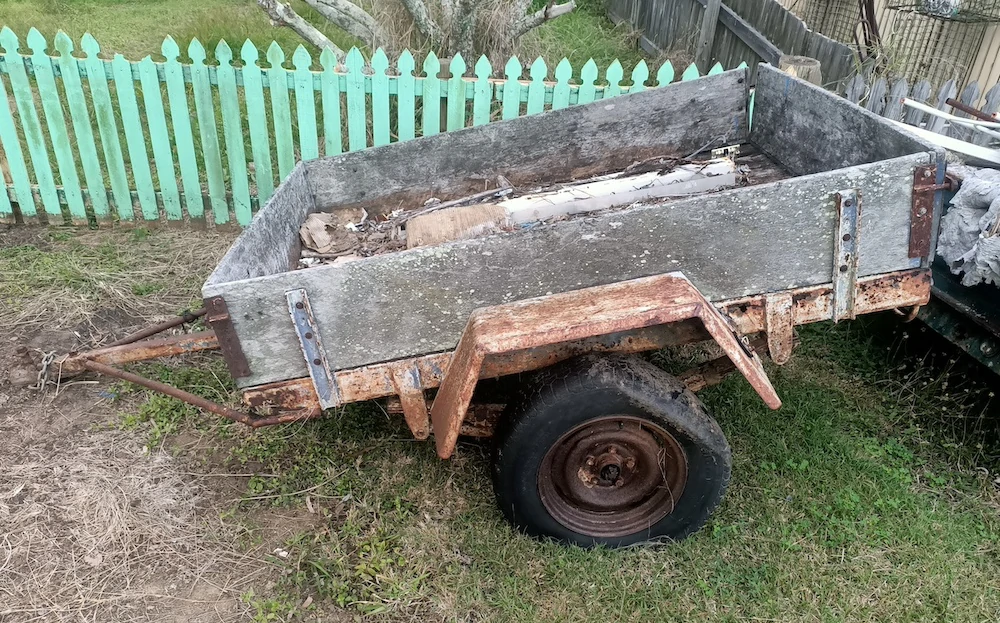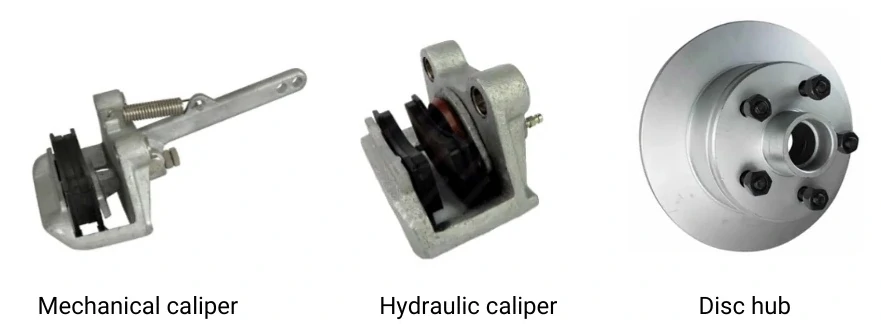
Menu
$ AUD
-
$ AUD
-
$ NZD
-
$ USD
-
€ EUR
-
$ CAD
-
د.إ AED
-
$ ARS
-
R$ BRL
-
£ GBP
-
Ft HUF
-
₹ INR
-
kr. ISK
-
KSh KES
-
RM MYR
-
K PGK
-
₲ PYG
-
₱ PHP
-
zł PLN
-
₽ RUB
-
R ZAR
-
฿ THB
-
₺ TRY


Choosing the right trailer brakes can be the difference between staying hitched or losing that precious load.
While some trailers are operable without brakes, there are many situations when they are far from optional. Our article ‘Australian Small Trailer Brake Regulations: Trailers up to 4500kg ATM‘ covers the legal requirements for brakes in Australia, but how do the different types of trailer brakes work and what are their advantages and disadvantages?
We’ve answered these questions and more to give you the ultimate lowdown on everything you need to know about the available trailer braking systems.
There are generally considered to be 3 types of trailer brakes:
The above three types of brakes work in conjunction with either a drum or disc hub mechanism. Both mechanical and hydraulic braking systems can use either a drum or disc hub, while electric brakes are confined to a drum hub (except in the case of electric-over hydraulic brakes).
Drum brakes feature an enclosed cylindrical assembly which houses the brake shoe on the inside. When the brake is activated, forces move the brake shoe outward, creating friction on the drum and slowing the turn of the wheels. Note that the ‘drum’ of a brake drum system is the same for electric, mechanical, or hydraulic brakes. The difference is how the shoe (the part that contains the brake pads) is operated/actuated.

Disc brakes, on the other hand, are composed of a rotor hub which is in part encased by the caliper and the brake pads. When activated, the inner brake pad is pushed towards the outer brake pad, creating a clamping motion on the rotor. The friction caused by the clamping of the rotor slows the trailer. With disc brakes you have mechanical or hydraulic. You can have electric disc brakes, though if you read on, you will see that this is a combination of braking systems.

Choosing to go with a drum or disc style mechanism will come down to the type of trailer you are building, legal requirements, how you would like to activate the brakes and the environment they will be used in. Below are the pros and cons of each.
| PROS | CONS |
|---|---|
| Cheap | Susceptible to brake fade |
| Simple to install | More moving parts |
| Available in most countries | More susceptible to corrosion due to their shape |
| PROS | CONS |
|---|---|
| More robust | Usually not compatible with electric brake controllers |
| Less maintenance | More expensive to set up when used on heavy trailers |
| Not as susceptible to brake fade | More moving parts when installed on heavy trailers due to the incompatibility with brake controllers |
Note: Brake fade occurs when heat buildup from friction produces drum distortions, making brakes less effective.
Mechanical brakes, sometimes called cable, over-ride or over-run brakes, work by mounting a sliding spring mechanism to the trailer’s drawbar (within the tow coupler/hitch). This spring contracts as soon as the trailer’s speed attempts to overrun the vehicle. This occurs when the tow vehicle brakes. When you brake, the cable tightens and activates the braking mechanism. When the towing vehicle stops braking, the spring decompressors and the brake mechanism deactivates. The trailer than resumes normal towing.
If you have mechanical brake drums, the cable will pull a lever which will apply the brake shoes to the inside of the drum to slow the trailer.
If using mechanical disc brakes, the cable will pull a lever, which will clamp the brake pads against the rotor causing your trailer to stop.
While mechanical breaks are simple to install and operate, you don’t have any control over the amount of braking applied.
The main components are:
| PROS | CONS |
|---|---|
| Simple system where not much can go wrong | Brakes are either ON or OFF |
| Less expensive and easy to install | Often not suitable for heavier trailers as they don’t work with an emergency brake controller |
| Smooth and consistent braking experience | Cable stretches over time and will need adjusting |
Hydraulic brakes, or hydraulic over-ride / over-run brakes, operate like mechanical brakes where they use the motion of the tow vehicle to activate the system. When the tow vehicle brakes are applied, this decrease in momentum compresses an actuator (on your tow coupler), which causes the master cylinder to force brake fluid through hydraulic lines to the brakes.
If you have hydraulic drum brakes, the fluid will enter the wheel cylinder and push the servomechanism out to expand the brake shoe against the drum and slow the trailer.
If you have hydraulic disc brakes, the fluid is sent through the brake line to the caliper piston. This results in the extension of the piston, which pushes the backing plate of the inner brake pad and squeezes the rotor to slow the trailer.
Hydraulic brakes can be challenging to operate when it comes to reversing. The pressure of your reversing vehicle against the trailer sends brake fluid to the brakes and can cause them to lock on. To avoid this, you will need brakes which are considered free-locking, or an actuator with a reverse lockout (this can be manual or electric to save you from having to get out of the car).
The main components are:
| PROS | CONS |
|---|---|
| Don’t require in-vehicle controller (unless using electric-over-hydraulic) | Brakes are either ON or OFF |
| More stopping power than mechanical brakes | System has potential fluid leaks |
| Uses fluid pressure rather than cable to create friction, slowing the trailer – this reduces the amount of wear and tear on components | Lag time between vehicle and trailer braking – can give a jerky towing experience |
A downside to an over-run style of system is that they are reactive, meaning that there is a short delay between when your vehicle brakes and when your trailer brakes. Whereas with electric brakes, they are simultaneously activated when the brakes in the tow vehicle are applied. This is an issue in some countries like Australia, where there are requirements for your brakes to be applied simultaneously for trailers over a certain weight. This reduces the braking options suitable for use.
If you want full control over your trailer’s brakes, then electric brakes are for you.
Electric brakes work by operating a controller that is mounted inside your vehicle. The brake controller determines the power of braking and sends an electric signal via the standard brake wiring to the trailer brakes to activate them. In this sense, they convert an electrical current into mechanical force to apply the brakes.
The signal sent from the brake controller energises an electromagnet inside each brake assembly. This results in a lever being pulled to apply the brake shoes inside the drum. The stronger the current that is being sent to the brakes, the stronger the braking force.
The main components are:
| PROS | CONS |
|---|---|
| Provides a more natural and responsive braking experience | Can be more expensive as you will need a brake controller |
| Full manual control from inside your vehicle | Requires a vehicle brake controller |
| Easy to maintain | Harder to install (because of the controller) |
| No hydraulic lines or cables required | Not suitable to being submerged in water |
The oddball! This type of braking system is considered to be a variation of electric brakes – they are a combination of both electric and hydraulic, as the name implies.
If you have hydraulic brakes and want to achieve the same level of control as electric brakes, you can use an electric-over-hydraulic actuator along with your electric brake controller – giving you the best of both worlds!
Once you’ve decided whether you want a drum or disc setup, you need to purchase a special electric-over-hydraulic actuator. This actuator receives brake signals from the electric brake controller and sends brake fluid to the hydraulic brakes as required. Make sure the controller you purchase is compatible with electric-over-hydraulic braking systems.
A breakaway kit enables the trailer brakes to be activated in the event of the trailer being disconnected while travelling. A breakaway kit includes a battery and switch that is wired to your electric brakes on the trailer. Then there is a cable that attaches to your vehicle and the other end to the breakaway unit.
If your trailer becomes disconnected, the cable is pulled out, triggering the switch. This causes power to be sent (from the battery) to the electric brakes to activate them and bring the trailer to a stop.
Getting back to brake controllers, there are a few options to consider.
Fitting your trailer with a handbrake is an extra convenience, regardless of which trailer braking system you choose. They are cheap, easy to install and can help hold your trailer in position when not attached to a vehicle.
If you want full control of your braking, then electric brakes are for you. The in-cab brake controller allows you to adjust the braking power and perform manual overrides. Electric drum brakes are generally cheaper than electric disc brakes (electric-over-hydraulic). But there are certain cases where electric disc brakes are better that drum brakes. For example, large boat trailers.
Hydraulic or mechanical override systems are a good option if your trailer will be towed by different vehicles because you don’t have to worry about vehicles being fitted with a compatible brake controller. They aren’t as easy to install as electric brakes, however, they are more robust and less things can go wrong.

Regardless of the braking system you choose, regular checks and maintenance of your trailer brakes should be front of mind when using your trailer. Of particular importance are the brake lines because if these aren’t working, neither are your brakes!
Like this post? Follow, like or share on your favourite social platform. You can leave us a comment below!